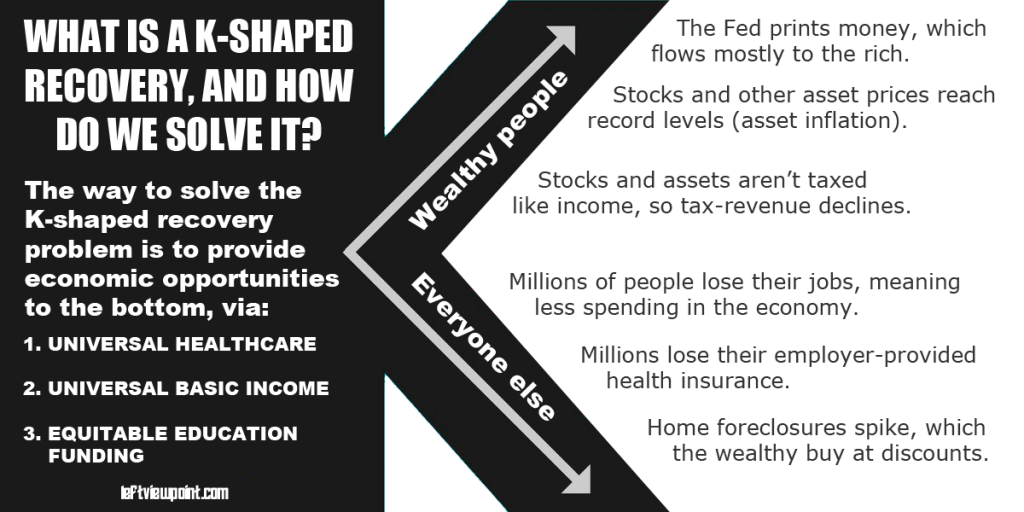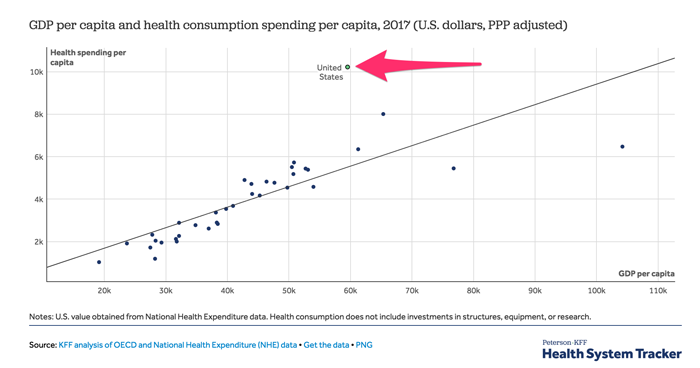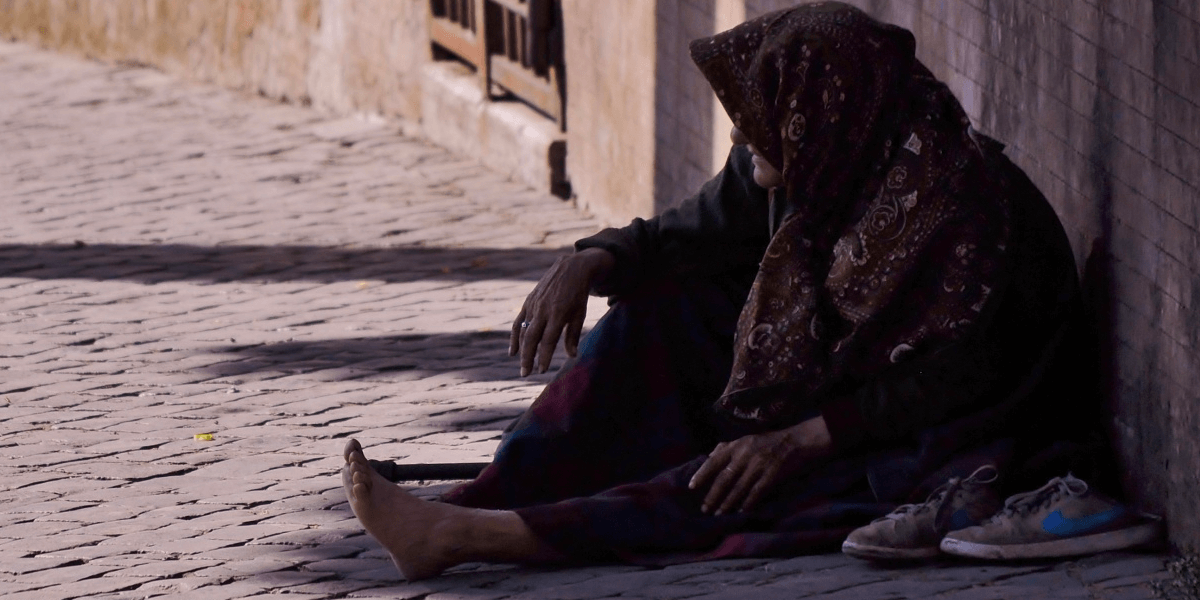Original article from: Yahoo! News
The longer you are a market-participant the more you try to see situations as simply as possible, even using playground games as visuals. In the game of seesaw, one partner rides up high expecting the partner on the bottom to gently let them down using the balance point as the balance. If not, the fall from on high is rapid and painful.
Our nation’s economic balance point has created a virtual seesaw, one where the wealthiest have risen so high, so fast, that those on the bottom may be unable to let them down without damage to everyone involved.
LEFT VIEWPOINTS
How can UBI and universal healthcare help grow the economy?
- This is a “K-shaped” recovery. The rich are getting richer and the poor are getting poorer. The money being printed by the Fed flows primarily to the wealthy. This is why the stock market has risen while the general economy has declined.
- The wealth inequality problem in the United States is at an all-time high. “The top 1% of wealth in the US has gone from a total pie of $4.88 trillion in 1990 to $32.55 trillion in 2020The top 1% of wealth in the US has gone from a total pie of $4.88 trillion in 1990 to $32.55 trillion in 2020.”.
- The Republicans passed a tax reform bill in 2017 that made this problem worse. Even before the pandemic, the deficit spiked after the tax cuts were passed because they failed to pay for themselves. What they did do was drive asset prices higher, which only helped those who had assets.
- To solve this problem, we have to get more money to the bottom part of the economic ladder. The most efficient way to do that is universal healthcare and a UBI. Both of these policies flow money to the poor so the economy can grow again.
What is a K-Shaped recovery?
When the Fed uses QE (quantitative easing) to get an economy going after a recession, they print money and buy government bonds. This is called monetary policy. A bond is like a loan. In this case, the Fed is loaning money to the government when it buys government bonds (treasuries) with printed money. The government (Congress) must decide how to spend the money they borrowed from the Fed. How Congress spends the money is called fiscal policy. Fiscal policy is virtually ineffective if Congress is gridlocked, which is why UBI and universal healthcare would help so much. When the stimulus was passed, it caused the economy to spike temporarily. UBI and universal healthcare would increase the disposable income of all Americans without relying on Congress. Ideally, the Fed would have control of the UBI, so it could raise it or lower it depending on the economic situation.

What is Universal Basic Income?
Instead of rock bottom being $0.00 and living on the street, a country with a UBI has a rock bottom set higher. Think of it as a way of flowing money through the economy. In a free-market capitalist economy, the wealthy accumulate more and more wealth until the economy cannot sustain growth anymore. Imagine trying to start a business when most people live in poverty. If people at the bottom of the economic ladder do not have income or wealth, they cannot help grow the economy. Wealth inequality and too much poverty become a drag on the economy and lead to other societal problems.
How can a UBI solve the wealth-inequality problem and grow the economy?
UBI takes money generated from the overall economy and allocates it equally to everyone without means-testing. Instead of trickle-down economics, UBI pushes money directly to everyone’s bank account. This causes the economy to grow because the people at the bottom have enough money to climb out of poverty. If they are homeless, they might find shelter. If they lack food and clothing, they can buy food and clothing. The idea is that the money from the economy that we all share is allocated equally to everyone, and the free-market determines how the money is spent.
UBI forces money to flow through the economy. One of the big traps of trickle-down economics is that money doesn’t get to the bottom fast enough. And when the entire economy collapses, as in the case of a severe recession or depression, it can take a very long time to recover. A UBI can solve this problem because it forces money to flow to everyone, which can be spent how people wish.
How can universal healthcare grow the economy?
Similarly to a UBI, universal healthcare would increase disposable income for almost every American. If healthcare is publically funded, nobody pays for healthcare out-of-pocket. People may pay higher taxes, but a person’s taxes decrease when they are out of work. If a person pays no taxes, that person’s healthcare is essentially free. When a person earns income, their higher taxes cover health insurance. However, even the higher tax rates would be less than what American’s currently pay in healthcare costs. That is because the United States has the highest healthcare costs in the world.

Why do safety nets help an economy?
Consider Sweden. Sweden has more entrepreneurs per capita than any other country. A big part of the reason is that it provides smart safety nets to empower people to start businesses.
By shifting healthcare to a public-expense, we can grow the economy and give every American health insurance. By supplying a UBI, we can eliminate most homelessness, grow the economy, and reduce the wealth inequality problem.

